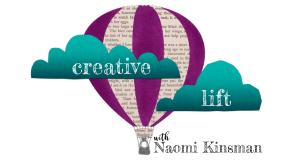When I write collaboratively, or for hire, I storyboard a book ahead of time. The creative limitations push me to work within boundaries, and honestly, cause me to take fewer risks.
On the other hand, when I write a book of my heart, I usually choose a question that beguiles and enchants me, which refuses to let me go. I follow my curiosity, tumbling through the drafting process, allowing the characters to be more than actors in my master plot. I find myself being surprised, challenged, pushed to consider alternate perspectives. I end up with a messy draft, but the final product is always a more interesting and original novel.

Recently, while reading Creativity: Flow and the Psychology of Discovery and Invention, by Mihaly Csikszentmihalyi, I found that my experience is common to other creatives. One of the many insights the book shares is that often, smaller amounts of progress are made when a question is posed to a creative and he or she works within limitations. Larger leaps happen when the creative both defines AND resolves a question.
When I think about it, this reality makes sense. Once twenty people have identified the fact that we need a book that shows us what happens when x meets y… the eventual books written may end up having many similarities. However, if the question is one most of us hadn’t yet asked, the resulting book is likely to push us to think in startling new ways.
The reality of this in my own writing process is that revision feels like untangling a delicate chain. I find a starting place and work to loosen one knot, only to realize that I’ve created another. The line from beginning of project to end is not straight or predictable. And yet, the unpredictability of this approach, the joy of discovery, the fact that I learn and grow through the writing, makes the struggle worthwhile.
I believe the artist’s job is to spend time wrestling with questions. We aren’t required to have more answers than other people, but we do need to ask more questions. We also need to spend more time working through the questions. The more time invested, the more work that we can do. Through conversations with others, revision, reflection, and feedback, we become more of who we desire to be, and our work becomes more than what we, personally, could have made it.
Maybe it’s not the most efficient way of writing a book. However, for me, it’s the way to end up writing a meaningful book.
So, here are some questions for you. Why are we all in such a rush? What are we all missing, due to our impatience? What might be possible if we slowed down and learned to savor the process?
I’d love to hear about your revision process, and how you deal with that ticking inner clock. Share below, or tag me on Facebook or Twitter. Let’s find ways to take the time we need to make our very best work.

